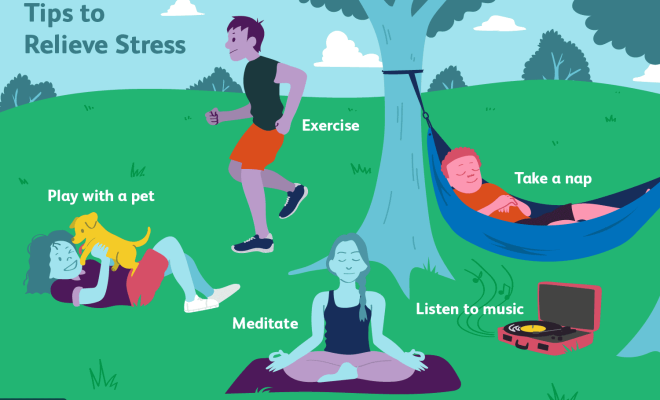How to Calm Stress: 15 Steps

Stress is a common issue that affects people of all ages and lifestyles. It can lead to negative health effects if not managed properly. Here, we have compiled a list of 15 steps to help you calm stress and promote a healthy life.
1. Deep Breathing: Practicing deep breathing exercises, such as diaphragmatic or belly breathing, can help calm your nervous system and reduce stress levels.
2. Mindfulness Meditation: Engage in a daily practice of mindfulness meditation, which can reduce stress, improve focus, and help manage emotions.
3. Exercise Regularly: Regular exercise is essential for overall well-being and can alleviate stress by boosting endorphins and reducing cortisol levels.
4. Maintain a Balanced Diet: Eating healthy foods like fruits, vegetables, lean proteins, and whole grains can help improve mood, support cognitive function, and reduce stress.
5. Prioritize Sleep: Aim for 7-9 hours of sleep each night to allow your body to recover from the day’s activities and minimize the impact of stress on your health.
6. Connect with Others: Socialize with friends, family, and colleagues to foster a sense of belonging and purpose, which can build your resilience towards stress.
7. Laugh: Laughter is an excellent natural remedy for stress relief. Watch comedies, attend a comedy show or share funny moments with friends.
8. Practice Gratitude: Focus on what you’re thankful for by keeping a gratitude journal or expressing gratitude during moments of trial or challenge.
9. Establish Boundaries: Setting boundaries in your personal and professional life helps maintain balance, preventing you from becoming overwhelmed by different aspects of life.
10. Simplify Your Life: Assess your daily activities and determine which tasks are essential and which can be delegated or eliminated to reduce stress levels.
11. Engage in Hobbies: Pursue hobbies that make you happy and help you relax, such as reading, painting, or gardening.
12. Listen to Music: Calming music can lower stress levels, lower heart rate, and reduce feelings of anxiety.
13. Step Away from the Screen: Limiting screen time can help relax your eyes and mind, reducing the chance of experiencing stress or burnout.
14. Seek Professional Help: If you’re struggling to cope with stress, consider seeking professional help from a licensed therapist who specializes in stress management techniques.
15. Practice Self-care: Prioritize your mental and physical well-being by incorporating daily self-care rituals like taking a warm bath, pampering yourself with a spa treatment, or spending time in nature.
Incorporating these 15 steps into your routine can significantly improve your ability to manage stress and maintain a healthier lifestyle. Remember that stress management is an ongoing process; it takes time and practice to achieve lasting results.






